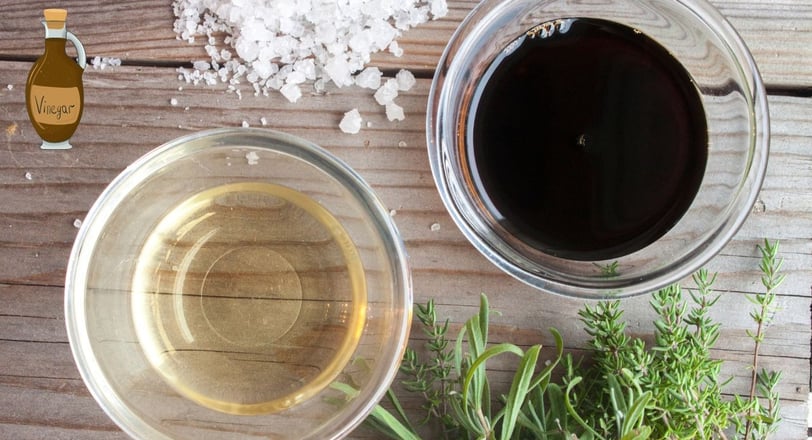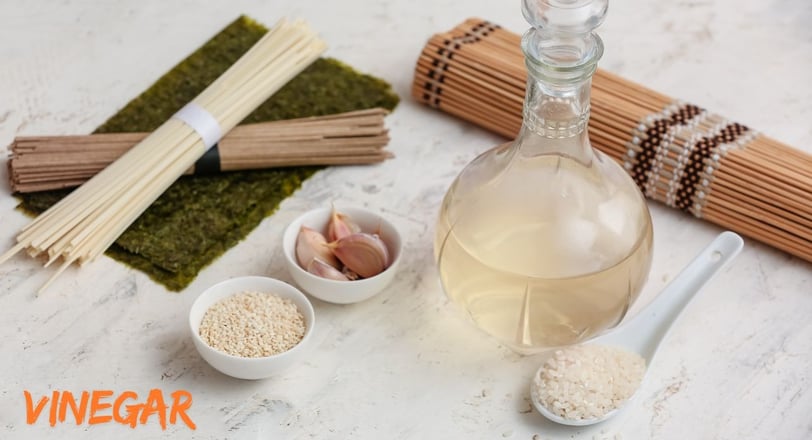Rice Vinegar
Rice vinegar is a type of vinegar made from fermented rice wine and is commonly used in East Asia—China, Japan, Korea and in Southeast Asia, especially Vietnam. It’s a key ingredient in many dishes, whether it’s sushi, dumplings, or side dishes. In some regions, some rice vinegars are even used as drinks.
Types of Rice Vinegar
There are many different kinds of rice vinegar, and each has a unique flavor and use. You'll find slightly different flavors and strengths depending on the region, but these are the main types you should know:
White Rice Vinegar
This is the most common type of rice vinegar, and you can usually get it at the local grocery store. It can be used in many different kinds of recipes because of its mild flavor and little tang.
Seasoned Rice Vinegar
Seasoned rice vinegar is often used to flavor sushi rice and it contains added sugar and sometimes MSG for extra flavor.
Brown Rice Vinegar
It's made from brown rice, which gives it a richer color and a few more nutrients. It’s still mild enough to use in place of white rice vinegar in most recipes.
Black Rice Vinegar
This is often used as a dipping sauce and comes from a mix of black glutinous rice, wheat, and other grains. It’s rich and packed with umami flavor.
Red Rice Vinegar
This type of vinegar is made with fermented rice and other grains, similar to black rice vinegar. It’s a little sweet, sour, and slightly funky in taste.
Is Rice Vinegar Good for You?
Rice vinegar is a staple in many Asian dishes because of its light sweetness and sourness.Rice is fermented to make alcohol, which is further fermented to produce acetic acid. The acidic flavor of rice vinegar comes from this.
Rice vinegar is quite acidic, just like other vinegars. Although there may be some health advantages to this acidity, it can also cause issues if consumed in large amounts. There are many folk remedies involving rice vinegar, but more research is needed to fully understand its health benefits.


Rice Vinegar Substitute
If you’re cooking and don’t have rice vinegar on hand, don’t worry! There are many substitutes you can use from your pantry:
Apple Cider Vinegar
Apple cider vinegar is the closest match to rice vinegar’s sweetness and acidity. While it has a slight apple flavor, it’s mild and works well in many dishes.
Use a 1:1 ratio when substituting apple cider vinegar for rice vinegar.
White Wine Vinegar
Another great substitute, white wine vinegar has a mild flavor that won’t overpower your dish. It’s more acidic, but you can sweeten it by adding a little sugar.
Use a 1:1 ratio, and if needed, add ¼ teaspoon of sugar per tablespoon of vinegar.
Champagne Vinegar
Light and delicate, Champagne vinegar is a good option when you need a mild flavor. It pairs well with seafood marinades and sauces.
Use a 1:1 ratio of Champagne vinegar to rice vinegar.
Sherry Vinegar
This vinegar has a subtle sweetness and nuttiness that makes it a decent alternative to rice vinegar.
Use a 1:1 ratio of sherry vinegar to rice vinegar.
Lemon or Lime Juice
While not a vinegar, lemon or lime juice can add the acidity you’re missing. Keep in mind that they leave a distinct citrus taste.
Use a 2:1 ratio of citrus juice to rice vinegar or adjust to taste.
Mirin (Rice Wine)
Mirin is a rice wine without the acid, but it can still add that umami flavor. It’s much sweeter, so be sure to adjust the recipe if needed.
Use a 1:1 ratio, but cut back on other sweeteners in the recipe.
Can You Substitute White Vinegar for Rice Vinegar?
While pure distilled white vinegar is common in most kitchens, it’s too harsh to use as a substitute for rice vinegar. Its strong acidity makes it better suited for cleaning than cooking.
Recipes Using Rice Vinegar
Fruity Gin & Tonic: Add a little bit of rice vinegar for a unique twist.
Brining: Use rice vinegar to add a little tang to your brining drinks.
Salad Dressing: For a light, flavorful dressing, combine 1 tablespoon rice vinegar with 2 tablespoons olive oil.
Pickling: Pickles can be made in a easy way by using rice vinegar to pickle vegetables like plums or radishes.


Rice Vinegar vs Rice Wine Vinegar
You may question if rice vinegar or rice wine can be used in place of rice wine vinegar in recipes requiring for it. Let's look at the differences:
Rice Wine Vinegar is the same as rice vinegar. Although they refer to the same fermented rice product, the names are used interchangeably. Both can be used in salad dressings, sushi rice, stir-fries, and other dishes.
Rice Wine is a fermented rice-based alcoholic beverage. Although it is frequently used in cooking and has a pleasant taste, it is not good substitute for rice vinegar.
Mirin vs Rice Vinegar
Both rice vinegar and mirin are essential ingredients in Japanese cooking, they have different purposes:
Mirin is a sweet Japanese rice wine used to season dishes like ramen and dumplings.
Rice Vinegar is more acidic and used in sushi rice, stir-fries, and pickling.
You can substitute them in some cases, but keep in mind that mirin will add sweetness, while rice vinegar will add acidity.
Differences Between Mirin and Rice Vinegar
1. Alcohol Content: Mirin contains alcohol, whereas rice vinegar has little to none left after fermentation.
2. Fermentation: Both come from fermented rice, but rice vinegar ferments longer to develop its acidic taste.
3. Flavor: Rice vinegar has a sour and tangy flavor, while mirin is sweet.
4. Uses: Rice vinegar gives a tangy kick, and mirin is great for sweetening dishes.
Rice vinegar is an incredibly versatile ingredient, whether you’re making sushi, salad dressings, or pickles. With these substitutes and tips, you’ll be able to use it in your cooking even if you don’t have the exact type of vinegar on hand.




